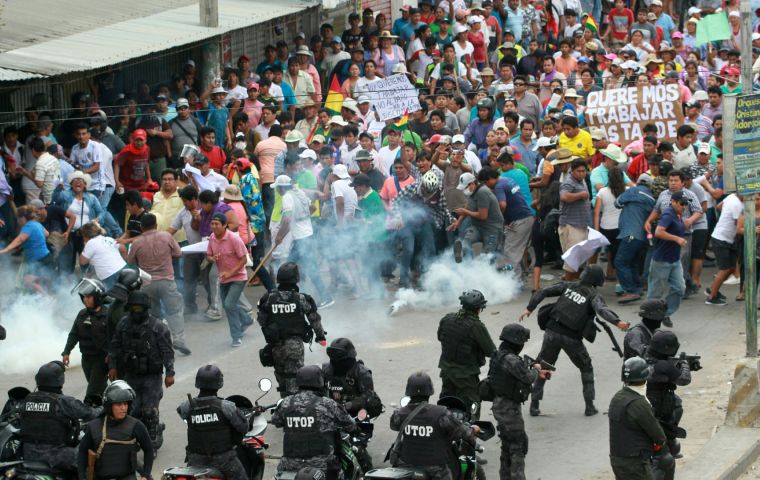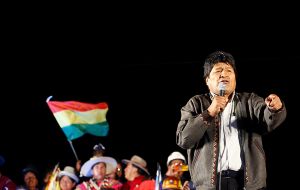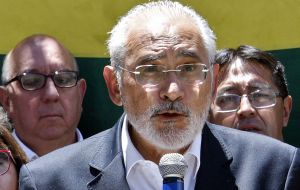MercoPress. South Atlantic News Agency
UN office in Bolivia calls on politicians for a rejection of all acts of violence
 Riots broke out after the controversial October 20 election won by Morales but described by Mesa as a “fraud,” as rival supporters clashed with each other
Riots broke out after the controversial October 20 election won by Morales but described by Mesa as a “fraud,” as rival supporters clashed with each other  Morales was re-elected in an election that was marred by a sudden and unexplained shift in the vote tally that benefitted the 60-year-old socialist leader.
Morales was re-elected in an election that was marred by a sudden and unexplained shift in the vote tally that benefitted the 60-year-old socialist leader.  Mesa and his allies are demanding the election results be annulled, while several foreign powers, including EU and US have called for a run-off.
Mesa and his allies are demanding the election results be annulled, while several foreign powers, including EU and US have called for a run-off. The United Nations on Tuesday called for an urgent de-escalation of tensions in Bolivia, where rival supporters of President Evo Morales and opposition leader Carlos Mesa have clashed since a disputed election.
The UN office in La Paz said in a statement that it was making a “resounding and urgent” call on politicians, social leaders and all Bolivians “to reduce tensions and reject all acts of violence.”
Riots broke out after the controversial October 20 election won by Morales but described by Mesa as a “fraud,” as rival supporters clashed with each other and security forces.
The UN office expressed “major concern about the serious acts of violence” between citizens throughout the country. Several people were injured in clashes in the central city of Cochabamba, a Morales stronghold, local media reported.
Morales was re-elected in an election that was marred by a sudden and unexplained shift in the vote tally that benefitted the 60-year-old socialist leader.
Mesa and his allies -- ranging from the center-left to the right -- are demanding the election results be annulled, while several foreign powers, including the European Union and United States, have called for a run-off.
Angry protesters have set up street barricades and gone on strike, while rival supporters have been involved in fist fights or attacked each other with makeshift weapons. Demonstrators have also clashed with security forces.
Dozens of people were injured in street battles on Monday as protests entered a second week.
The government has agreed to allow the Organization of American States (OAS) to audit the vote count, although no start date has been announced.
Vice President Alvaro told reporters the government had invited Mesa “to submit to the audit.” Mesa, 66, fired back that he would only do so if the government rejects the electoral tribunal's official results.
He said the government must also accept the audit's “binding nature.”
Although he didn't earn an absolute majority in the first round, Morales did garner a lead of more than 10 points over Mesa, and under Bolivian law that gave him an outright victory. Otherwise, there would have been a run-off next month.
Morales reached the crucial 10-point cushion in controversial fashion on October 21 when his lead suddenly jumped during the ballot count -- an incident that led the OAS to voice “surprise” and “concern.”
Morales is already Latin America's longest serving leader, having been in power since 2006. He is now set to retain the presidency until 2025. His very candidacy was a scandal, though, as Bolivia's constitution limits a president to two successive mandates. Morales has just won a fourth.
Morales, Bolivia's first indigenous president, lost a 2016 referendum in which he tried to remove term limits but the Constitutional Court let him run again anyway.




Top Comments
Disclaimer & comment rulesCommenting for this story is now closed.
If you have a Facebook account, become a fan and comment on our Facebook Page!